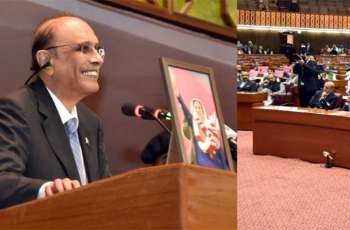Islamabad, (Pakistan Point News - 25th May, 2018) : Foreign Office spokesman said the World Bank has assured Pakistan that it would make utmost efforts to resolve Kishanganga and Rattle dams issues within the parameters of Indus Basin Treaty. Dr. Muhammad Faisal, who was part of the Pakistan team that recently visited Washington and held talks with world Bank on the issue, said this at the weekly news briefing in Islamabad today. He said Pakistan believes inauguration of Kishanganga dam by India without resolution of the disputes is violation of the treaty.
The water talks between the World Bank and Pakistan concluded on Wednesday without reaching any agreement on a way forward to address Islamabad's concerns regarding the Kishanganga project. A four-member delegation, led by Attorney General for Pakistan Ashtar Ausaf, arrived at the World Bank head office to apprise the Bank authorities about the country's concerns of more than a dozen projects that India intends to complete along the Indus Basin, that Pakistan deemed in violation of the Indus Water Treaty.
Pakistan had the view that these projects would disrupt its water supplies, and insisted that the design of the recently-inaugurated Kishanganga Hydroelectric plant was not in line with the criteria laid down under the Treaty. Pakistan's Ambassador to the US Aizaz Ahmad Chaudhry told media earlier that its Foreign Ministry had suggested changes in the basic design to avoid Treaty violations but those proposals were ignored. As opposed to the claims made by Pakistani officials that the delegation was to meet with the World Bank president for three days to discuss technicalities of the project; the World Bank confirmed that the delegation actually met with senior officials, including the CEO Kristalina Georgieva and the regional management for South Asia on May 21 and 22 at Pakistani government's request to discuss issues and opportunities within the Treaty.
During these meetings, several procedural options for resolving the disagreement over the interpretation of the Treaty's provisions were discussed, according to the World Bank, "an agreement on the way forward was not reached at the conclusion of the meetings." The Bank maintained that it will work with both countries (India and Pakistan) to resolve the issues in an amicable manner and in line with the Treaty provisions. The Treaty brokered by the World Bank in 1960 is a profoundly important international agreement that provides an essential cooperative framework for India and Pakistan to address current and future challenges of effective water management to meet human needs and achieve development goals.
In a statement issued by the spokesperson, the World Bank clarified that, "as a signatory of the Treaty, the World Bank's role is limited and procedural. In particular, the role in relation to "differences" and "disputes" is limited to the designation of people to fulfill certain roles when requested by either or both parties." In a statement issued by the spokesperson, the Bank said that it remains committed to act in good faith and with complete impartiality and transparency in fulfilling its responsibilities under the Treaty, while continuing to assist the countries.
Pakistan had raised this issue in September last year as well, when delegations from both sides were at the World Bank to talk out their disagreements and concerns about the construction of the Kishenganga and Ratle hydroelectric power plants. They disagreed over whether the technical design features of the two plants contravene the Treaty. The plants are on respectively a tributary of the Jhelum and the Chenab rivers. The Treaty designates these two rivers as well as the Indus as the "western rivers" to which Pakistan has unrestricted use.
Those talks could not reach any conclusion either. Meanwhile, the World Bank (WB) is non-committal for taking any steps to resolve water disputes between Pakistan and India. According to the statement issued by Washington based lender World Bank after holding two-day meetings with Pakistani delegation that demanded of the Bank to play its role on construction of Kishenganga Hydropower Plant by India which Islamabad termed violation of Indus Water Treaty (IWT) signed by the two countries under the guarantee of the Bank. "As a signatory to the Treaty, the World Bank's role is limited and procedural. In particular, the role in relation to "differences" and "disputes" is limited to the designation of people to fulfill certain roles when requested by either or both parties," the WB states.



